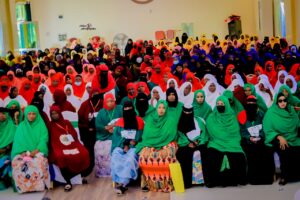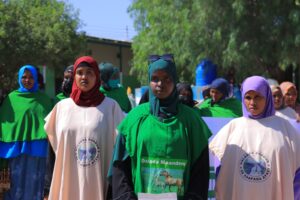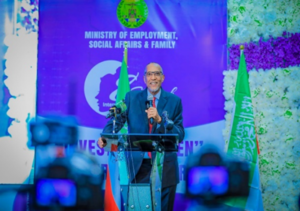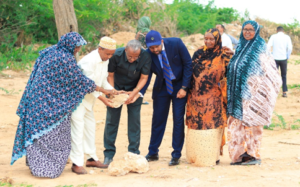In a world where marginalized and vulnerable women often find themselves voiceless and overlooked, the rise of Self- Self-help groups (SHGs) in Somaliland represents a profound transformation for marginalized and vulnerable women, who have historically been voiceless and unheeded. These grassroots, women-led initiatives offer a platform for support, advocacy, and economic empowerment. However, the journey toward empowerment is fraught with challenges, including inadequate infrastructure for SHG federations, which hampers their potential.
The Birth of SHGs in Somaliland
 The NAFIS Network began the Self-Help Group Approach in Somaliland in September 2013 with funding from Kindernothilfe. Kindernothilfe operates this program in 11 African countries, including Burundi, Ethiopia, Eswatini, Kenya, Uganda, Rwanda, Malawi, South Africa, Zambia, Zimbabwe, and Somaliland. The pilot project began in Hargeisa, Buroa, Maroodi-Jeeh, and Togdheer regions, involving 12 promoting organizations from both NAFIS members and non-members.
The NAFIS Network began the Self-Help Group Approach in Somaliland in September 2013 with funding from Kindernothilfe. Kindernothilfe operates this program in 11 African countries, including Burundi, Ethiopia, Eswatini, Kenya, Uganda, Rwanda, Malawi, South Africa, Zambia, Zimbabwe, and Somaliland. The pilot project began in Hargeisa, Buroa, Maroodi-Jeeh, and Togdheer regions, involving 12 promoting organizations from both NAFIS members and non-members.
These initial efforts led to small groups comprising 15 to 20 women, primarily from impoverished families in internally displaced persons (IDP) and host communities in Hargeisa and Burao. As these groups flourished, they evolved into the second level, Cluster Level Associations (CLAs), each comprising 8 to 10 SHGs and elected representatives from each SHG member. The rapid expansion created two significant women SHG federations—Kaaba and Qaran—in Togdheer and Maroodi-Jeeh, specifically in Hargeisa and Burao. Kaaba Federation supports 54 CLAs, while Qaran Federation in Buroa supports 30 CLAs, representing over 23 thousand individuals across both federations.
Currently, the SHG program in Somaliland is effectively operating in six regions, spanning from urban areas to rural villages. The SHG program has become an instrumental tool for eradicating poverty, combating gender inequality, and promoting women’s participation in socio-economic development at both national and household levels. It also encourages their role in political participation, from the community level to the national level
Challenges in Infrastructure
 Despite the positive impact of Self-Help Groups (SHGs) in Somaliland, significant infrastructural challenges impede their growth and efficiency. The absence of proper facilities and communication networks severely restricts their ability to scale operations and engage effectively with the government and other stakeholders. This is especially problematic in rural areas, where the need for such support is often greatest. Many SHGs lack formal meeting spaces, resorting to gathering under trees or rotating meetings in members’ homes. These infrastructural deficiencies hinder the efficiency and effectiveness of SHGs and limit their ability to reach a broader audience and achieve their full potential. Addressing these challenges is crucial for enhancing the impact of SHGs and fostering sustainable development in Somaliland.
Despite the positive impact of Self-Help Groups (SHGs) in Somaliland, significant infrastructural challenges impede their growth and efficiency. The absence of proper facilities and communication networks severely restricts their ability to scale operations and engage effectively with the government and other stakeholders. This is especially problematic in rural areas, where the need for such support is often greatest. Many SHGs lack formal meeting spaces, resorting to gathering under trees or rotating meetings in members’ homes. These infrastructural deficiencies hinder the efficiency and effectiveness of SHGs and limit their ability to reach a broader audience and achieve their full potential. Addressing these challenges is crucial for enhancing the impact of SHGs and fostering sustainable development in Somaliland.
Empowerment through Advocacy and Engagement
Nonetheless, these challenges have bolstered the capacity of women in SHGs to advocate for systemic changes at community, regional, and national levels. Women in SHGs actively participate in community decision-making processes and engage with local governments and other stakeholders. SHGs have become powerful tools for women’s empowerment, providing a safe space for sharing experiences, gaining financial literacy, and fostering economic independence. Through SHGs, women build confidence, develop leadership skills, and create a collective voice to influence community and national policies. They pool resources, start small businesses, and access microloans, significantly improving their socioeconomic status
A Landmark Achievement
 On March 8, 2024, a momentous occasion unfolded on International Women’s Day, as Ms. Hinda Gaaxnuug, Chairperson of the Kaaba Federation in Hargeisa, took centre stage at the official commemoration event. Amidst the dignified setting of the Mansoor Hotel in Hargeisa, she seized the opportunity to engage directly with President Muse Bihi Abdi of Somaliland, amplifying the voices of the women she represents With poise and conviction, Ms. Gaaxnuug articulated the remarkable strides made by the Self-Help Group (SHG) program, underscoring its impact and potential. Yet, she did not shy away from shedding light on the pressing challenges faced by her federation, notably the lack of a permanent space to call their own.
On March 8, 2024, a momentous occasion unfolded on International Women’s Day, as Ms. Hinda Gaaxnuug, Chairperson of the Kaaba Federation in Hargeisa, took centre stage at the official commemoration event. Amidst the dignified setting of the Mansoor Hotel in Hargeisa, she seized the opportunity to engage directly with President Muse Bihi Abdi of Somaliland, amplifying the voices of the women she represents With poise and conviction, Ms. Gaaxnuug articulated the remarkable strides made by the Self-Help Group (SHG) program, underscoring its impact and potential. Yet, she did not shy away from shedding light on the pressing challenges faced by her federation, notably the lack of a permanent space to call their own.
In a bold move that reverberated nationwide, Ms. Gaaxnuug beseeched President Bihi for assistance, petitioning for land and a dedicated building to house the Kaaba Federation in Hargeisa. It was a plea not just for physical infrastructure but for recognition, validation, and support for the tireless efforts of women striving for empowerment through collective action.
 President Bihi’s response was nothing short of historic. He pledged to fulfil the Kaaba Federation’s request in a landmark declaration, signalling a paradigm shift in governmental engagement with women’s issues and grassroots initiatives. His commitment marked a watershed moment, symbolizing the dawn of a new era where the voices and needs of women in SHGs are acknowledged and championed at the highest echelons of power.
President Bihi’s response was nothing short of historic. He pledged to fulfil the Kaaba Federation’s request in a landmark declaration, signalling a paradigm shift in governmental engagement with women’s issues and grassroots initiatives. His commitment marked a watershed moment, symbolizing the dawn of a new era where the voices and needs of women in SHGs are acknowledged and championed at the highest echelons of power.
This pivotal exchange epitomized the essence of International Women’s Day—a celebration of women’s achievements, a call to action for gender equality, and a testament to the transformative power of advocacy and solidarity. It stands as a beacon of hope for women across Somaliland, inspiring them to continue their journey towards empowerment with unwavering determination and optimism for a brighter, more inclusive future.
A Promising Future
 On May 4th, the Ministry of Public Works, Land, and Housing, along with the Ministry of Employment, Social Affairs, and Family of Somaliland, publicly announced the handover of the land to the Chairperson of the KAABA Federation. This significant step towards addressing infrastructural issues signifies a turning point in the fight for women’s empowerment in Somaliland. Providing land and resources for constructing SHG buildings will enable KAABA federations to operate more effectively, organize better, and mobilize their members, symbolizing a break from systemic neglect.
On May 4th, the Ministry of Public Works, Land, and Housing, along with the Ministry of Employment, Social Affairs, and Family of Somaliland, publicly announced the handover of the land to the Chairperson of the KAABA Federation. This significant step towards addressing infrastructural issues signifies a turning point in the fight for women’s empowerment in Somaliland. Providing land and resources for constructing SHG buildings will enable KAABA federations to operate more effectively, organize better, and mobilize their members, symbolizing a break from systemic neglect.
The commitment to improving infrastructure for SHGs in Somaliland reflects a broader recognition of women’s essential role in community development and national progress. Empowering women through these groups enhances their socio-economic status and fosters a more inclusive and equitable society. The journey of the Self-Help Groups in Somaliland, particularly the Kaaba Federation, is a testament to the resilience and determination of women to create a better future for themselves and their communities. The promise of land and infrastructure validates their efforts and lays the groundwork for more extensive advocacy and empowerment initiatives, setting a precedent for future support and development.
